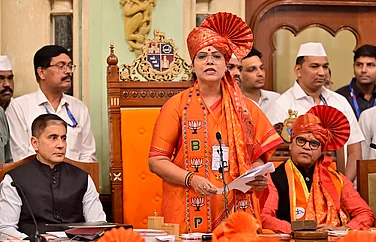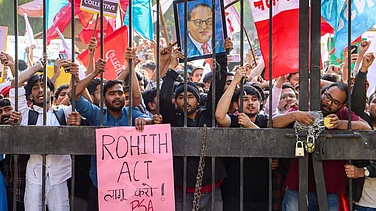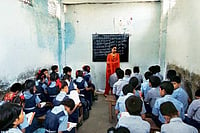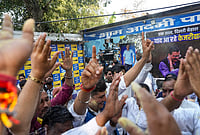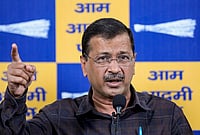To the enormous satisfaction of its rowdy cheer-leaders, the Modi government in November 2019 withdrew the Special Protection Group (SPG) security cover of the three Gandhis, Sonia, son Rahul and daughter Priyanka. Predictably, the Congress corner cried foul, but many saw this decision as yet another manifestation of the no-nonsense ruthless approach of the new Union home minister who was already basking in the glory of abrogating Article 370. The saffron crowd was in its own zone.
But, then, the law of unintended consequences kicked in.
The Gandhi family was rudely told that there was nothing special about them, and that they could not presume to a notional parity with the institutional office of the prime minister. Narendra Modi would be the sole focus of this elite force.
The SPG was much more than a physical barrier; it was and is a psychological wall for both sides. All these years, the very presence of the SPG had induced among the Gandhis a sense of exclusiveness, an imaginary space that they were entitled to and which the others, including the Congress activists, were not allowed to breach.
It became a useful addiction. The family, its various members in various degrees, ducked the politician’s basic and fundamental obligation—the natural, unhindered, uninhibited openness to the public. Both Jawaharlal Nehru and Indira Gandhi were transformed figures whenever they found themselves in the midst of adoring crowds, feeling and striking a mythical rapport with the masses. They not only drew political legitimacy but also spiritual energy from the company of the masses.
Sonia Gandhi, in any way, was not cut out for the rough and tumble of a political life; and when she did find herself in it, she came in with an SPG ring around her. Yes, security considerations were very real, but the SPG cover did lend an unreal dimension to her political persona. Her two children, Rahul and Priyanka, too incurred the SPG-induced distortions. The Congressmen, consciously and unconsciously, found themselves in awe of the family—its specialness underlined 24 x 7 by the ubiquitous SPG cover.
On top of the two comprehensive defeats at the national level, in 2014 and 2019, suddenly that vaunted cover was gone. The Modi government had done the Gandhis a great favour—it forced the family to re-examine the very basis of its claims and ambitions and its relationship to the Congress. The family found itself having to readjust its manners, if not its presumptions of a kind of dynastic entitlement.
The family’s transition began kicking in, slowly and incrementally. The Congressmen began losing their awe of the Gandhis, and the Gandhis, especially Rahul, began diluting their contempt for the Congressmen. The gestation period has lasted more than two years.
Had a vindictive Modi government not withdrawn the SPG cover, Rahul Gandhi would not have been on the road, leading the ‘Bharat Jodo Yatra’ from the front. The security wallahs would have poked in with their objections nor would have those like Digvijaya Singh and Jairam Ramesh, who imagined and conceptualize the yatra, been insistent in their entreaties to him to join the planned march from Kanyakumari to Kashmir.
Suddenly, the Congress supporters, activists and the leaders found themselves having to talk, cheer and get excited about a cause that was not narrowly focused on the honour, prestige or the dignity of the Gandhis. In a long time, the Congress is seen as engaging with an idea bigger than the dynasty. It is no coincidence that many putative allies of the Congress have had no hesitation in associating, even if only symbolically, with the yatra.
On its part, the family seems to have overcome the phobia of the crowds. From all accounts, Rahul Gandhi seems to be enjoying the energising company of common men and women as the ‘Bharat Jodo Yatra’ snakes its way across the land. Hopefully, the experience would be entirely wholesome and Rahul Gandhi would find his own inner equilibrium.
The family seems relieved to have been relieved of the burden of the Congress presidentship. It is coming to terms with a realisation that it does not have the magic wand. Without the paraphrenia of national power, the job is time-consuming, often soul-numbing, invariably unsatisfactory and inevitably unrewarding. The onus of hauling the Congress party and its compulsively intriguing ‘leaders’ over the winning line is back-breaking.
Though Priyanka did hog the spotlight in the Congress party’s election campaign in Himachal Pradesh, so far no one from the family has put in an appearance in the Gujarat election. On their part, the Gujarat Congress leaders and the no-nonsense strategists are quite content to wage a low-decibel campaign; there is no enthusiasm among the Congress candidates to have Rahul or Priyanka campaign for them. Without a Gandhi around, Narendra Modi and company are having a hard time dusting up passion and excitement in the saffron ranks.
A non-Gandhi as the AICC president has already induced a new sense of collective functioning. For the first time in more than 20 years, the party candidates’ names are being finalised and announced without “Sonia ji” being the last court of appeal. The Congress leaders are learning, willy-nilly, to bargain and compromise among themselves. First time, the Congress partisans do not have the burden of defending ‘the dynasty’ as an organisational totem.
Yet it is unrealistic to expect or hope that the Gandhis would stop mattering in the affairs of the party. The ‘Sonia people’—those who respected and were respected by Sonia Gandhi—have either faded away (like the late Ahmed Patel, A.K. Anthony and Manmohan Singh) or have carved out an autonomous role (like Digvijaya Singh, Ashok Gehlot, Siddaramaiah, Kamal Nath and Jairam Ramesh). These are ‘organisational men’ who would be happy and content to work with a non-Gandhi Congress president on terms of mutual respect.
It was the Rahul coterie that would have a vested interest in ensuring that Sonia Gandhi remains an important pivot. This crowd consists primarily of intriguers and is fashionably unfamiliar with the best of the Congress culture. It would be most fascinating to see if Rahul has made his own transition to a larger purpose than the one defined for him by this coterie. Priyanka, too, is not without her own entourage of durbaris. These two sets of ‘advisers’ can be relied upon to see to it that the Gandhis continue to wield influence and power in party matters.
A complete transition to a non-Gandhi Congress will not be without its convulsions. Habits, procedures and protocols instituted these last two decades will not get discarded overnight. However, a regime change is unavoidable for the simple reason that the ‘dynasty’ is a theme song that is no longer heard in Narendra Modi’s ‘New India’. The Gandhi family is in transition, so is the Congress. The Congress may soon find itself on the verge of a grand transformation. And that should augur well for Indian democracy.
(This appeared in the print edition as "Caught in Transition")
(Views expressed are personal)
Harish Khare is a Delhi-based senior journalist and public commentator












